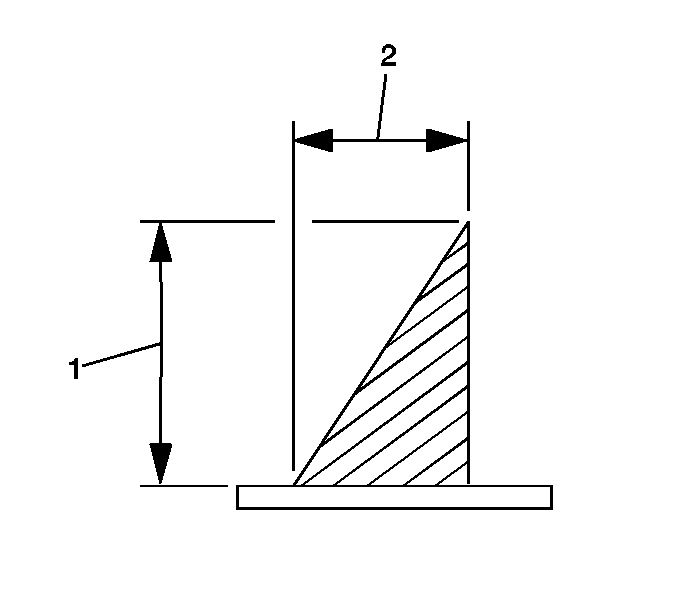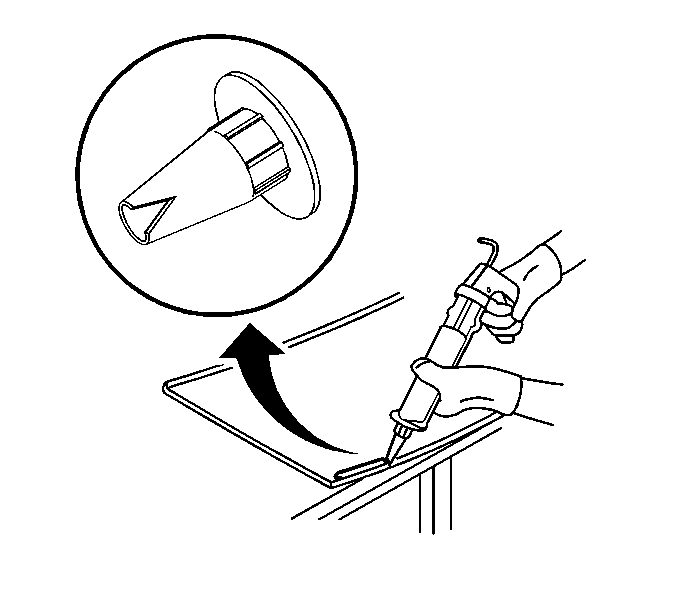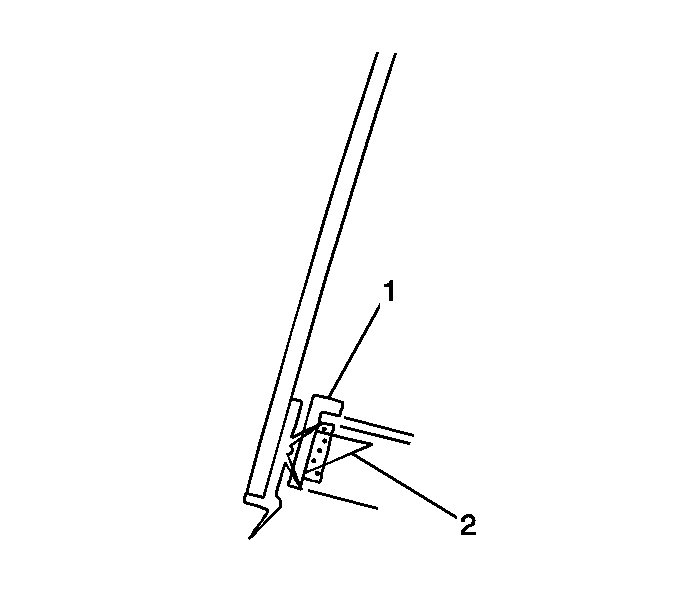Note: Remove all but 2 mm (3/64 in) of the existing urethane adhesive from the pinch-weld flange. This will ensure proper depth of window in relations exterior trim.
- Remove all mounds or loose pieces of urethane adhesive from pinch-weld flange areas.
- If the original window assembly is being reused, remove all but a thin film of existing urethane from the window frame surface by using a clean utility knife or razor blade scraper.
- Clean around the inside edge of the window assembly with a 50/50 mixture of isopropyl alcohol and water on a dampened lint-free cloth.
- Verify all primers an urethane adhesives are within expiration dates.
- Failure to prepare the area prior to application of primer may cause insufficient bonding of urethane adhesive. Insufficient bonding of urethane adhesive may allow unrestrained occupants to be ejected from the vehicle resulting in personal injury.
- Shake the black #3 primer for at least 1 minute.
- Use a dauber in order to apply the primer to the surface of the pinch-weld flange.
- Allow the pinch-weld primer to dry for approximately 10 minutes.
- With an assistant, dry fit the window assembly into the opening to determine correct position.
- Using masking tape, mark the location of the window assembly to the opening.
- Apply Glass Prep #1 followed by Glass Primer #2 on the encapsulation material. Allow to dry for 6 to 10 minutes.
- Cut the applicator nozzle in order to provide a bead of 10 mm high (1) and 6 mm wide (2).
- Using a cartridge-type caulking gun in order to apply a smooth continuous bead of urethane adhesive.
- Use the inside edge of the window frame (1) as a guide for the nozzle in order to apply the urethane adhesive bead (2) to the window frame bonding surface.
- With the aid of an assistant, place the window assembly into the opening. Make sure window frame alignment pins are properly located.
- Press the window firmly into place.
- Tape to window to the body in order to minimize movement until the urethane adhesive cures.
- Clean any excess urethane adhesive from the body.
- Use a soft spray of warm water in order to immediately water test the window.
- Inspect the window for leaks.
- If any leaks are found, use a plastic paddle in order to apply extra urethane adhesive at the leak point.
- Retest the window for leaks.
- Maintain the following conditions in order to properly cure the urethane adhesive.
Note: If corrosion of the pinch-weld flange is present or if sheet metal repairs or replacement are required, the pinch-weld flange must be refinished in order to restore the bonding area strength. If paint repairs are required, mask the flange bonding area prior to applying the color coat in order to provide a clean primer only surface. Materials such as BASF DE15, Dupont 2610, Sherwin-Williams PSE 4600 and NP70, Martin-Semour 5120, PPG DP90LF, Spies/Hecker 3688/8590 3688/5150 4070/5090, and Standox 11158/13320 14653/14980 are approved for this application.
Warning: Refer to Window Retention Warning in the Preface section.
Note: Do not apply the black #3 primer to the existing bead of urethane adhesive on the pinch-weld flange. Apply the primer only to nicks, scratches or the primed surfaces.



Note: Do not direct a stream of high pressure water to the freshly applied urethane adhesive.
Warning: Insufficient curing of urethane adhesive may allow unrestrained occupants to be ejected from the vehicle resulting in personal injury.
• For the moisture-curing type of urethane adhesive, allow a minimum of 6 hours at 21°C (70°F) or greater and with at least 30 percent relative humidity. Allow at least 24 hours for the complete curing of the urethane adhesive. • For the chemical-curing type of urethane adhesive, allow a minimum of 1 hour .
| • | Partially lower a door window in order to prevent pressure buildups when closing doors before the urethane cures. |
| • | Do not drive the vehicle until the urethane adhesive is cured. Refer to above curing times. |
| • | Do not use compressed air in order to dry urethane adhesive. |
